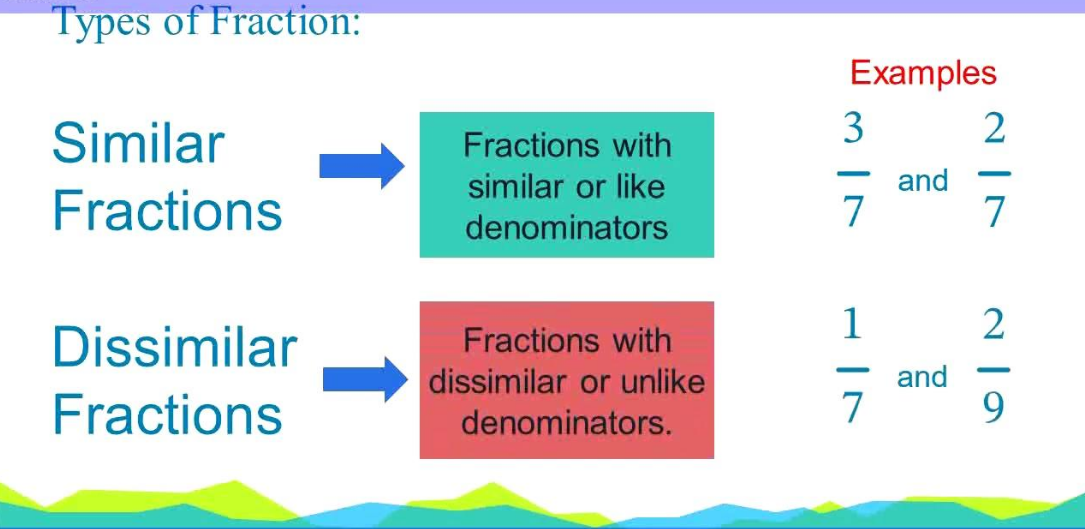Introduction: Fractions Dissimilar
Alright, kids (and maybe some parents 👀), today we’re talking about dissimilar fractions. Sounds scary? Nah. It just means fractions that don’t match. You know, like 1/2 and 1/3 — different bottom numbers. That’s what makes them “dissimilar.”
And yeah, if you’re in Grade 4, 5, or 6, your math books are full of this stuff. Fractions with different bottoms (denominators) show up in real life too — like cutting pizzas 🍕, splitting money 💰, or sharing snacks at lunch.
Let’s break it down simply. No pressure. No math panic. Just easy steps, tricks, and practice. 👇
What Are Dissimilar Fractions?
Basic Meaning
- Fractions = part of something.
- Dissimilar fractions = fractions with different denominators (bottom numbers).
Examples:
- 1/4 and 1/3 → dissimilar
- 2/5 and 3/5 → similar (exact bottom)
Easy rule: If the bottoms don’t match, they’re dissimilar.
Visual Example
Imagine two pizzas:
- 🍕 One cut into 4 slices → 1/4
- 🍕 One cut into 3 slices → 1/3
You can’t just add them. They’re chopped up differently.
That’s why you gotta make them similar before adding or subtracting.
Why Are Dissimilar Fractions Important?
Practical Usage
Fractions show up EVERYWHERE.
- Sharing snacks
- Dividing time
- Splitting money
- Cooking
And most of the time, you’re dealing with dissimilar ones. Like 1/2 hour + 1/4 hour = ? You gotta fix the bottoms first.
Similar vs Dissimilar Fractions
| Feature | Similar Fractions | Dissimilar Fractions |
| Denominator | Same | Different |
| Example | 2/5 + 1/5 | 2/3 + 1/4 |
| Easy to Add/Subtract | ✅ Yes | ❌ No (convert first) |
| Grade Focus | Grade 3–4 | Grade 4–6 |
How to Identify Dissimilar Fractions
Step-by-Step
- Look at the denominators (bottom numbers).
- Are they the same?
- ✅ Same → Similar
- ❌ Different → Dissimilar
- ✅ Same → Similar
Examples:
- 1/6 and 5/6 = similar
- 3/8 and 2/5 = dissimilar
How to Make Dissimilar Fractions Similar
Method 1 – Find the LCM
LCM = Lowest Common Multiple of the denominators.
Steps:
- List multiples of both denominators.
- Find the smallest one that matches.
- Convert both fractions.
Example:
1/3 and 1/4
→ Multiples of 3: 3, 6, 9, 12, 15…
→ Multiples of 4: 4, 8, 12, 16…
LCM = 12
→ 1/3 = 4/12, 1/4 = 3/12
Method 2 – Cross Multiplication (for comparing)
If you’re just comparing (not adding), you can skip LCM:
Compare 2/5 and 3/7:
- Cross multiply:
2×7 = 14
3×5 = 15
→ 15 > 14 → 3/7 is bigger.
Steps to Add Dissimilar Fractions
Simple 3-Step Process
- Find the LCM of the denominators.
- Convert fractions to the exact bottom.
- Add the numerators.
H4: Example
1/2 + 1/3 = ?
- LCM of 2 and 3 = 6
- 1/2 = 3/6
- 1/3 = 2/6
→ 3/6 + 2/6 = 5/6
Boom. ✅
Steps to Subtract Dissimilar Fractions
Process Same as Addition
- Find LCM
- Convert fractions
- Subtract tops
Example
5/6 – 1/4 = ?
- LCM of 6 and 4 = 12
- 5/6 = 10/12
- 1/4 = 3/12
→ 10/12 – 3/12 = 7/12
How to Simplify the Final Answer
Once you add or subtract, you might need to reduce the result.
How?
- Find the GCF (Greatest Common Factor) of the top & bottom.
- Divide both.
Example:
8/12 → GCF = 4
→ 8÷4 / 12÷4 = 2/3
Practice Questions for Grade 4
- 1/2 + 1/3 = ?
- 2/5 – 1/4 = ?
- Convert: 3/4 and 5/6 to same denominator
Practice Question for Grade 5
- 7/8 + 2/3 = ?
- 5/6 – 1/2 = ?
- Which is bigger: 2/3 or 3/5?
Practice Questions for Grade 6
- 11/12 + 5/6 = ?
- 3/10 – 2/5 = ?
- Simplify: (5/6 + 7/12)
Common Mistakes to Avoid
- ❌ Adding tops and bottoms directly
(Ex: 1/2 + 1/4 ≠ 2/6) - ❌ Forgetting to convert
- ❌ Skipping simplification
- ❌ Wrong LCM
Word Problems Involving Dissimilar Fractions
Example 1 – Pizza Sharing
You ate 1/3 of one pizza, and your friend ate 1/4 of another.
→ How much did you eat together?
→ Find LCM, add: 4/12 + 3/12 = 7/12
Example 2 – Time Spent on Homework
Math: 1/2 hour
Science: 1/3 hour
→ Total = ?
→ 3/6 + 2/6 = 5/6 hour
Example 3 – Money and Budgeting
Spent 2/5 of allowance on toys, 1/4 on snacks
→ Total spent = ?
→ Convert, add = 8/20 + 5/20 = 13/20
Fun Ways to Learn Dissimilar Fractions
Fraction Games
- Pizza Fraction Game (use real slices)
- Online drag-and-drop fraction games
- Fraction bar chart matching
Worksheets & Flashcards
- Use printable fraction flashcards.
- Color-coded worksheets
- Cut-out paper pies for hands-on learning
Tips to Master Dissimilar Fractions
- Always find LCM first.
- Use visuals (draw pies, bars)
- Practice a little every day.
- Say the steps out loud as you solve
FAQs – Students Ask These a Lot
Are 1/2 and 3/2 similar or dissimilar?
Similar. Same bottom = 2.
Why do we need the same denominator?
Because you can’t mix pieces of different sizes, it’s like adding apples and bananas — it doesn’t work.
Can we use a calculator?
Sometimes yes, but it’s better to learn the method first. Then check the answers with a calculator.
Teacher Tips for Explaining Dissimilar Fractions
- Use real-life objects (blocks, slices, candies)
- Start with visuals, then numbers.
- Let kids solve in pairs.
- Focus on steps, not just answers.
Mental Math for Dissimilar Fractions
How to Estimate
- Round to 0, 1/2, or 1
- Ex: 2/5 is close to 1/2
- Helps for quick checks
Quick LCM Tricks
- Use multiple lists
- Or just multiply the two denominators (works, but not always the smallest)
Example:
1/3 and 1/6
→ 3 × 6 = 18 (works)
→ But LCM = 6 (better)
Assessment Table for Students
| Skill | Beginner | Intermediate | Pro |
| Identifying Dissimilar | ✅ | ✅ | ✅ |
| Adding/Subtracting | ❌ | ✅ | ✅ |
| Simplifying | ❌ | ❌ | ✅ |
| Word Problem Solving | ❌ | ✅ | ✅ |
Conclusion – Why Fractions Dissimilar Matter
Recap of Learning
You just learned:
- What dissimilar fractions are
- How to convert and add/subtract them
- Why LCM is your best friend
- How to use these in daily life
Final Thought
Yeah, fractions can be tricky, but once you know the steps, they’re kind of fun.
Just remember:
👉 Find LCM
👉 Convert
👉 Solve
👉 Simplify
Practice a few times a day, and you’ll be a fraction ninja 🥷 in no time.






